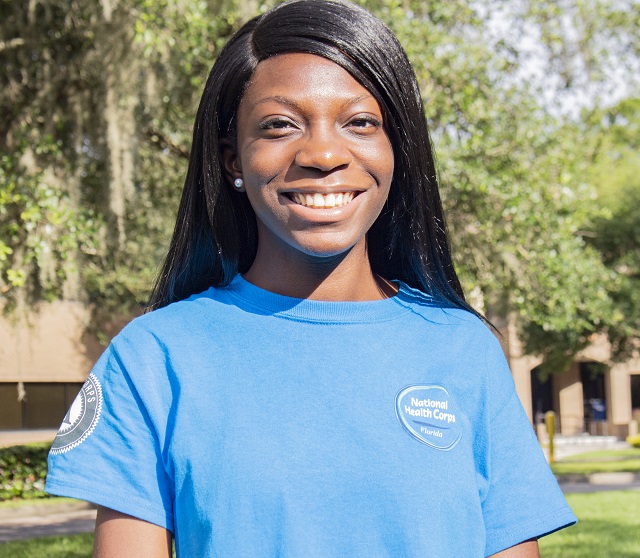In 2018, 147 babies died before their first birthday. That’s comparable to eight classes of kindergarteners. I learned about this alarming statistic on my first day of service at the Northeast Florida Healthy Start Coalition. This statistic is directly related to the Coalition’s mission to reduce the infant mortality rate, and now as the NHC FL AmeriCorps Care Coordinator, it’s become my mission as well.
 At her first prenatal visit, an expectant mother should receive a Healthy Start Screen - a questionnaire used to measure and determine risk factors. If the mother is interested, she will be contacted to see if she would like to receive services to assist her during and after her pregnancy. These services include education classes on a variety of topics, voluntary home visitation programs, support with breastfeeding and childbirth, and much more. As a Care Coordinator, one of my roles is to connect interested women to these services and other community resources. These resources include organizations that provide free baby items, assist with paying utilities, finding government housing, or whatever assistance the mother is in need of. Additionally, I provide education classes on pre/postnatal nutrition and Safe Sleep, assist mothers with their Medicaid for Pregnancy application, and find resources within the community that would aid a mother in need.
At her first prenatal visit, an expectant mother should receive a Healthy Start Screen - a questionnaire used to measure and determine risk factors. If the mother is interested, she will be contacted to see if she would like to receive services to assist her during and after her pregnancy. These services include education classes on a variety of topics, voluntary home visitation programs, support with breastfeeding and childbirth, and much more. As a Care Coordinator, one of my roles is to connect interested women to these services and other community resources. These resources include organizations that provide free baby items, assist with paying utilities, finding government housing, or whatever assistance the mother is in need of. Additionally, I provide education classes on pre/postnatal nutrition and Safe Sleep, assist mothers with their Medicaid for Pregnancy application, and find resources within the community that would aid a mother in need.
Another aspect of my position is to conduct home visitations for high-risk mothers who, after multiple attempts, have not been able to be reached by phone. I am given the mother’s address, a list of her risk factors, and I go out into the community to see if I can get the mother connected to services. When I am successful in making contact with the mother, we discuss how her pregnancy has been progressing, I address the issues that put her at risk, I connect her to community resources, and (if she chooses) a home visitation program. This part of my position can be challenging when I am unable to make contact with a mother due to an incorrect address, a family member not passing along the message that I stopped by, or simply because the mother is not interested in receiving services. However, these  challenges are small compared to the times I am able to help a mother who does not know where to turn and is excited that the Healthy Start Coalition can provide her with resources.
challenges are small compared to the times I am able to help a mother who does not know where to turn and is excited that the Healthy Start Coalition can provide her with resources.
Recently, I conducted a home visitation to an expectant mother who was six months pregnant and, according to her screen, scored into the high risk category. After speaking with her, I learned that she had not received any prenatal care for two months. She explained that she had to stop working because of her high risk pregnancy and thought that she would be able to receive Medicaid until she was able to go back to work. Unfortunately, her Medicaid application had taken longer to get approved than she thought it would. While waiting for approval, she had gone into preterm labor twice because she was no longer able to afford the medication that prevented her from going into preterm labor. Because of the knowledge gained during my service term, I knew that there was an organization that provides prenatal care to women who are uninsured. I was able to connect her to the community resource and provide her with the help that she was in need of.
I was a bit apprehensive before starting my service term at the Coalition. As someone who does not have children of her own, I was worried that I would have trouble connecting with the population that I served. Fortunately, that was far from the case. Empathy and lending an ear go a long way.
Serving at an organization that works endlessly to better the health of mothers, babies, and families has been extremely rewarding and has taught me so much. I am enjoying my experience with the Coalition and helping more babies live to see past their first birthday.

This blog was authored by NHC Florida member Mockelaux Bonzongo.
Mockelaux serves at Northeast Florida Healthy Start Coalition as a Care Coordinator.
